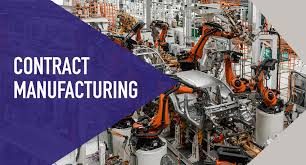
Contract manufacturing is one of the important components of international business. It offers the contract manufacturing company importers a way to efficiently produce their goods without having to invest heavily in manufacturing facilities.
Simply, contract manufacturing includes hiring another company located in different countries to produce goods and parts of goods on behalf of the hiring company. The arrangement can lead to multiple benefits.
Let’s explore it a bit more.
What is Contract Manufacturing?
Contract manufacturing is essentially a business arrangement where one company (the client) outsources its production needs to another company (the manufacturer). The manufacturers produce the goods based on the specifications of clients to make sure that the final product meet the requirement standards and quality.
In an international context, contract manufacturing often involves campness from different countries. For example, a company based in the United States might contract a manufacturer in China to produce electronic items.
It allows the client company to leverage the manufacturing expertise, lower labor costs, and efficient production processes of contract manufacturing companies importers.
Benefits of Contract Manufacturing
Contract manufacturing provides you with several advantages that can specifically impact the operation and profitability of your company. Here are some of the key benefits.
Cost Savings
One of the most appealing advantages of contract manufacturing is cost savings. You can reduce your production costs by outsourcing to manufacturers in countries with lower labor and production costs. It helps you to allocate resources more efficiently and focus on other critical areas like research, development, and marketing.
Focus on Core Competencies
When you outsource the manufacturing process, you can concentrate on the core competencies. It means that you can dedicate more time and resources to activities that directly contribute to your competitive advantage such as product design, innovation, and customer service. It also frees up the management to focus on strategic planning and business growth.
Access to Expertise and Technology
Contract manufacturers often have specialized knowledge, skills, and advanced technologies that might not be available in-house. You can partner up with these manufacturers and benefit from their expertise and cutting-edge equipment that leads to higher quality products and more efficient production processes.
Flexibility and Scalability
Outsourcing production to a contract manufacturer provides you with great flexibility and scalability. You can easily adjust your production levels based on market demand without the need to invest in additional facilities or equipment. It is especially beneficial for businesses with seasonal products or fluctuating demand.
Risk Mitigation
Contract manufacturing can help mitigate risks that are associated with production. For example, if a company faces issues with its own production facilities, having a contract manufacturer can makes sure that continuity in the supply chain. In addition to this, contract manufacturers often have stringent quality control measure in place which reduce the right of defective products.
Type of Contract Manufacturing
Contract manufacturing can take carious forms which depend on specific needs and arrangements between the client and the manufacturer. Here are some common types of contract manufacturing.
Component Manufacturing
In component manufacturing, the contract manufacture produces specific parts or components that are then used by the client company in their final products. This type of manufacturing is common in industries like electronics, automotive, and aerospace, where complex products need multiple specialized components.
End-To-End Manufacturing
End-to-end manufacturing includes the contract manufacturer handling the entire production process from sourcing raw materials to delivering the finished products. It is the arrangement that is often used by companies that want to completely outsource their production operations to focus on other aspects of their business.
Private Label Manufacturing
It occurs when a contract manufacturer produces goods that are then sold under the brand name of the client. IT is common in industries like food and beverages, cosmetics, and apparel, where companies want to offer branded products without investing in their production facilities.
Custom Manufacturing
This type of manufacturing involves producing goods which are based on the unique specifications and requirements of the client. This manufacturing is customized to meet specific needs and often requires close collaboration between the client and the manufacturer. It is prevalent in industries like pharmaceuticals, medical devices, and high-end consumer goods.
Assembly and Packaging
Some contract manufacturers specialize in the assembly and packaging of the products. In this type of arrangement, the client produces the components themselves or sources them from other suppliers and the contract manufacturer handles the assembly and packaging process. It is common in industries such as consumer goods and electronics.
Conclusion
So, this is how contract manufacturing works. It is the most common practice across the industries. A good way to source the products and maintain the quality while focusing on the other important tasks. It provides you range of benefits and you can choose from multiple types to suit your needs.